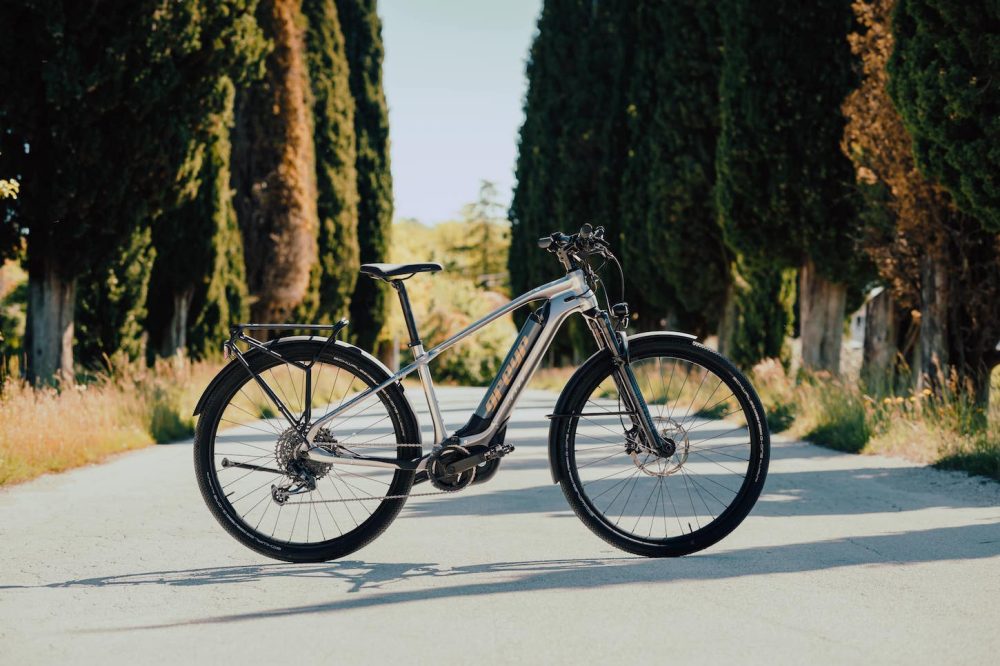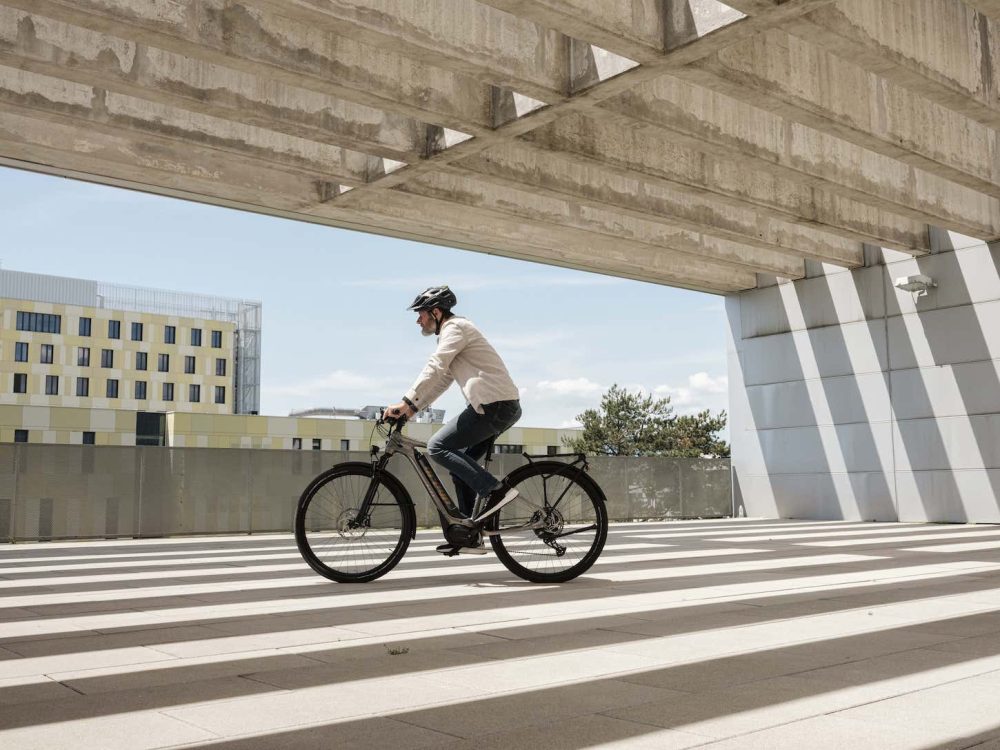
Nestled in the outskirts of Zagreb, Croatia, sits an unassuming building where some of the most high-tech electric bicycles in the world are dreamed up, designed, and then manufactured. Greyp applies the same kind of forward-thinking approaches as its electric supercar parent company, Rimac, resulting in e-bikes that are both high performance and high tech. Now the company has branched out into yet another e-bike category as it tackles trekking bikes with the new Greyp e-SUV T5.
And to help me get a better understanding of what goes into these e-bikes, Greyp brought me out to their headquarters and gave me the honor of the first-ever external test of the new bike.
Trekking bikes fill that gray area where road and mountain bikes overlap, offering a more rugged and comfortable ride than gravel bikes but with better off-road performance than a typical hybrid bike.
They usually come outfitted with fenders, racks, lights, and other components needed for road and utility use, but with wider tires and handlebars that are especially well-suited to riding in less than ideal conditions.
And with an added electric motor, trekking e-bikes can help riders push longer and farther on all sorts of adventures.
The Greyp T5 builds upon the tech-infused platform developed for the Greyp G6 line, including the same motor and battery setup, but implements it on a totally new frame and loadout that is better suited for trekking type adventures.
Make sure you check out my first ever test ride on the Greyp T5 as I explored the lovely Croatian countryside, then continue on below for my full thoughts on this new electric trekking bike.
Greyp T5 test riding video
Rolling hills and rolling wheels
The Greyp T5 is designed to tackle everything from a morning commute through the city to a week of bikepacking through the Alps.
Its aluminum frame marks a departure from Greyp’s expertise with carbon frames, but also helps drop the price while also being a little more forgiving than a carbon frame.
Adorning the frame is a host of high-end components that each impact the experience of the ride. While flying fast over dirt trails I had the confidence of a dedicated mountain bike, yet I still felt quick and efficient in the city – not like I was lugging a mountain bike through an urban jungle.
That’s thanks to the hybrid design of a good trekking bike like the T5, something that can split the gap between the two distinct disciplines.
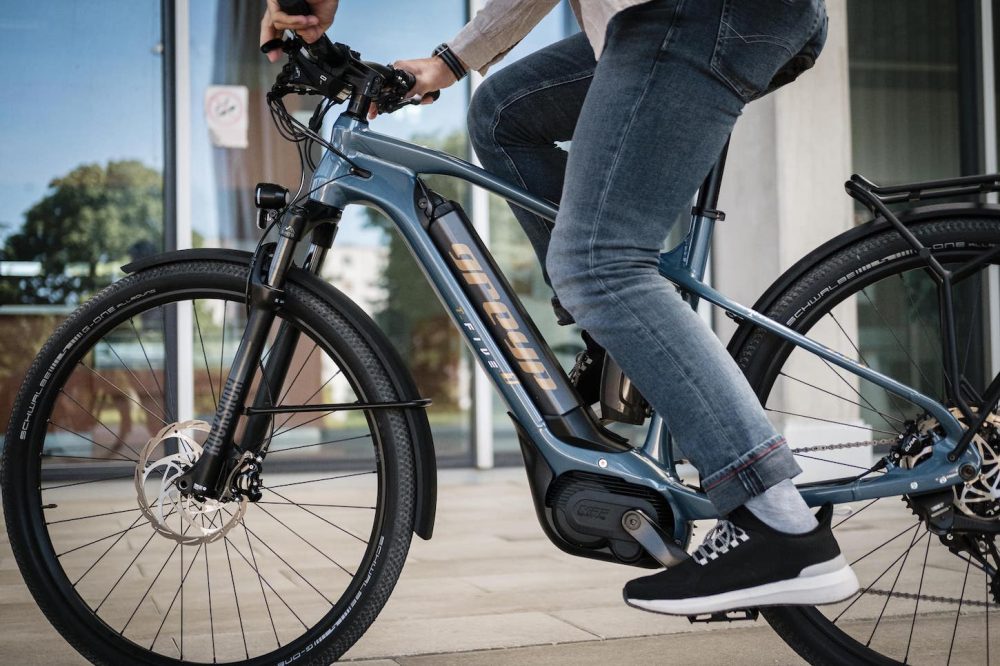
Making it work comes down to the right design and the right components.
Wide mountain bike-style handlebars give finer control on trails. And even though they don’t rise up with a tall stem, the bike’s geometry cuts a nice balance between a comfortable, upright ride position and enough tuck to feel agile in the saddle.
A RockShox Debonair fork with 100 mm of suspension provides proper handling when the terrain gets rough – whether that means tree roots or potholes. It keeps that large 29″ front wheel on the deck where it belongs and saves your wrists from a world of hurt too.
The matching rear wheel doesn’t benefit from suspension – true to trekking bike form – but that also keeps the bike’s weight and price down.
Powering the bike is Greyp’s signature 700 Wh battery that makes up a key design element on the bike. It was originally developed for the G6 as a floating central battery, but now rests in a holder on the downtube.
There’s also a new locking mechanism built into the frame, which is obviously important for a bike that lives half of its life in an urban utility role.
With 700 Wh of battery – much larger than most trekking e-bike powerpacks – achieving a range of 100 km (62 miles) is certainly doable with pedal assist.
The MPF mid-drive motor powers the bike up to 25 km/h (15.5 mph) in EU settings, though a US model will likely offer higher speeds. The drivetrain includes a SRAM GX Eagle 12-speed with custom Greyp cranks, and a set of high-end Formula Cura dual-piston hydraulic disc brakes bring the bike’s speed back to zero.
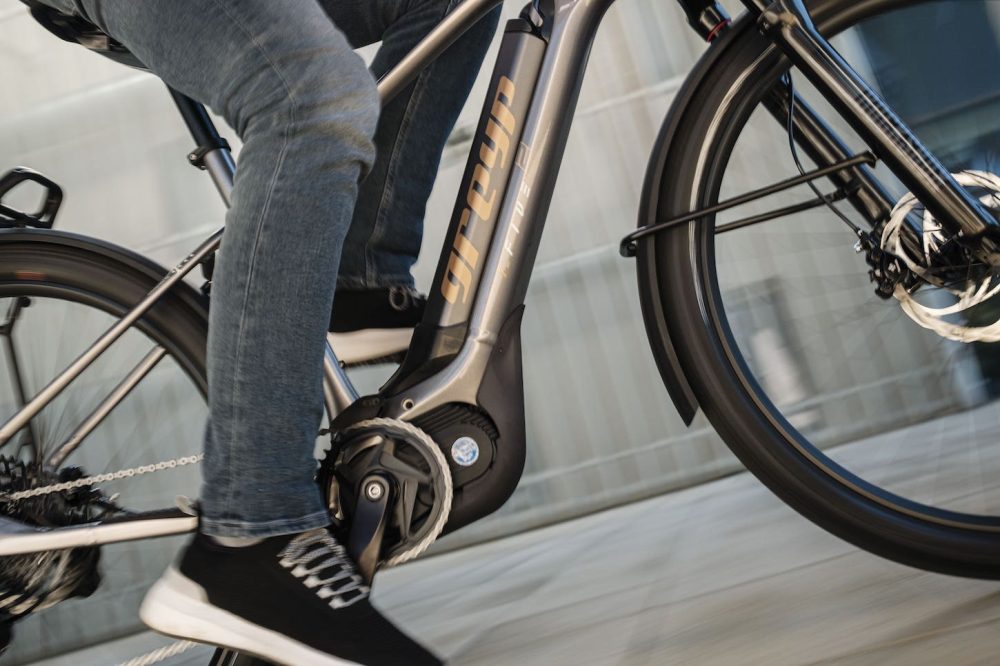
The wide gear range from the 11-50T cassette made it easy to switch from fast flatland pedaling to more grueling hill climbing, and the motor assist certainly helped with that last bit too.
The power isn’t overwhelming, but 90Nm of torque was a welcome addition on a few rocky climbs I completed.
When I wasn’t chewing up gravel, I was pounding the cobblestones of adorable little Croatian villages in the countryside. There I was able to experience the more commuter-friendly side of the bike. Built-in mudguards integrate with custom racks and mounting points to add accessories like Ortlieb panniers directly onto the bike.
And the T5 comes standard with high-power Busch+Müller LED lights – not just some dinky e-bike lights. These fancy lights provide focused illumination and actually throw some real lumens around.
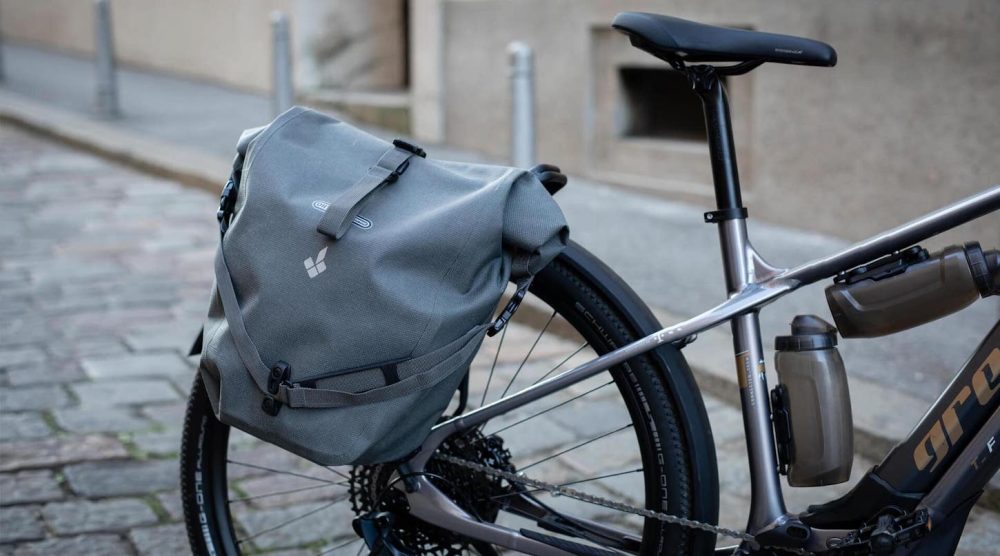
But what really sets Greyp’s T5 apart is the embedded technology. All of Greyp’s e-bikes come with a built-in e-SIM that provides constant connectivity to the cloud.
Unfortunately I wasn’t able to test the app integration yet since I was performing my test a few months ago when the bike was finished but the app was still getting its last few touches.
I’ll let the Greyp team speak for themselves though about the app’s unique features and benefits:
“A Greyp bike wouldn’t be a Greyp bike without its integrated eSIM which delivers constant connectivity, and for the complete experience, the accompanying Greyp App provides additional numerous handy features. The Greyp App can be used in two modes: Dashboard and Remote. The Dashboard mode transforms the smartphone into an extended dashboard and gives access to various features like turn-by-turn navigation, terrain-based range, camera, and Retro Video, while the Remote mode can be used much like the bike`s remote control, so users can text, take a photo, remotely lock the bike, or activate the kill switch to shut it down completely.”
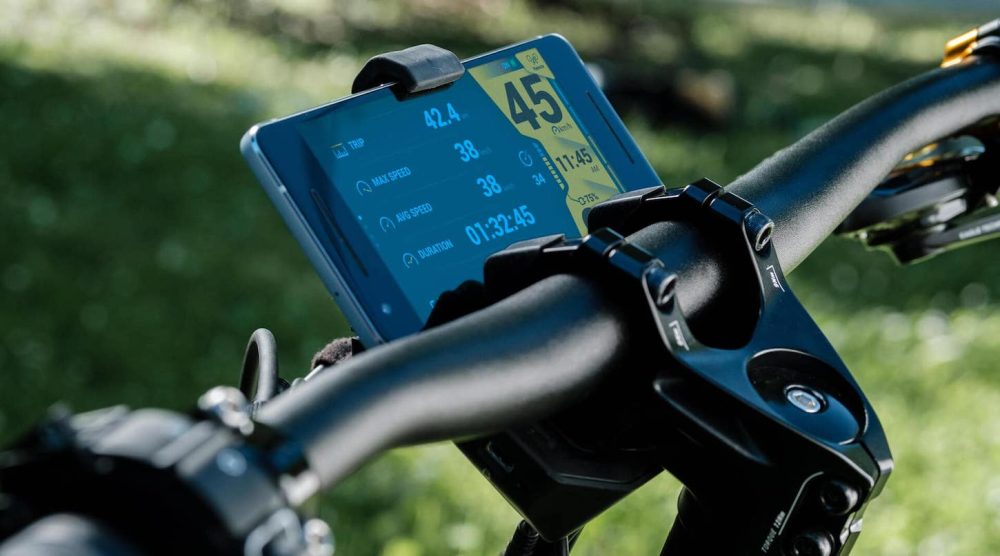
I got a taste for the high-tech flair of the bike on the previous G6 model though, where I was able to experiment with the different camera setups.
With both front and rear-mounted wide-angle waterproof cameras, it’s really fun to be able to capture your adventure rides from multiple angles to share later. And with a bike that is also designed for the street, the ability to use the cameras as a dash cam is a huge benefit. You can have them always running to capture your entire commute as an added layer of safety and documentation.
Hopefully you’ll never need to rely on them that way, but it’s much easier to grab a license plate number when you have a constant front and rear HD recording of your ride.
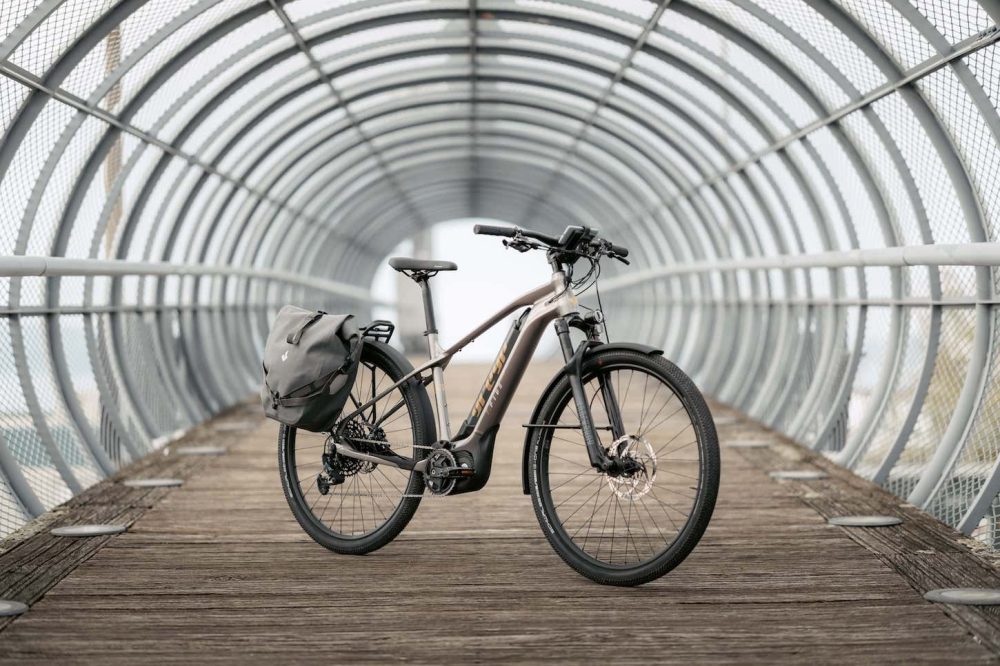
The biggest difference in the Greyp T5 compared to other e-bikes I’ve tested is just how much attention Greyp paid to the details. They build everything in-house and that gives them ultimate control. They program their own motor profiles to give riders the exact type of power application and ramping desired. They design their own buttons and keypads to provide as much utility in the easiest-to-use package possible. They even design their own frame tubes to get the exact style of bike they want. As Greyp explained to me, “Some companies just choose an e-bike out of a catalogue and sell it. Others go farther and choose a frame from the catalogue. Others are even more involved and choose from a catalogue of tubes to build a frame. We start from scratch and design our own tubes.”
Basically, Greyp builds these e-bikes from the ground up as Greyp bikes – not just any other e-bike with a logo on it. And that level of design is readily apparent in the finished product.
You pay for that level of quality and design, and it isn’t cheap with a starting MSRP of €4,499 (approximately USD $5,300). But that’s the difference between Greyp and other companies. Greyp has its offices overflowing with engineers, designers, mechanics, battery builders, testers, marketers, and salespeople all living under one roof, something most companies can’t claim.
As a premium model, this obviously isn’t an e-bike for everyone. But for those that can afford it, the quality and ride experience will make it worth every penny. I’d kill to have one in my garage, that’s for sure!
Subscribe to Electrek on YouTube for exclusive videos and subscribe to the podcast.
Author: Micah Toll
Source: Electrek



